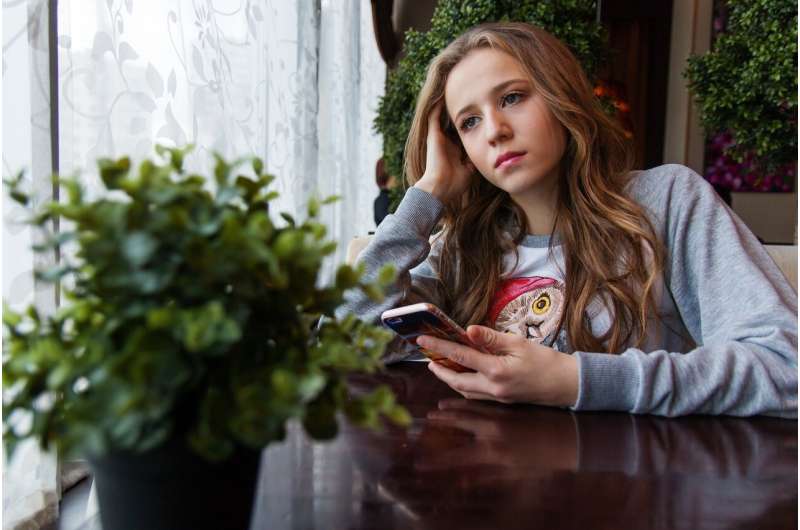
Credit: CC0 Public Domain
Most American teens aren’t always getting the social and emotional support they need, and most of their parents have no idea, according to a new report from the Centers for Disease Control and Prevention.
In a national survey conducted after the most isolating period of the COVID-19 pandemic, only 28% of teens ages 12 to 17 said they “always” had the social and emotional support they needed. However, 77% of parents who responded to a related survey said they thought their children “always” had that support.
On the other end of the spectrum, 20% of teens said they “rarely” or “never” had enough social and emotional support. That realization was shared by just 3% of their parents, according to the report released Tuesday by the CDC’s National Center for Health Statistics.
This perception gap was shared to some extent by families across all racial and ethnic categories and at all levels of family income, the CDC statisticians found. The same was true for families with teenage girls as it was for families with teenage boys.
Parents with college degrees or higher underestimated their teens’ need for social and emotional support, as did parents with high school diplomas or less. Parents misjudged their children’s feelings regardless of whether they raised their families in big cities, rural areas and communities in between, the researchers reported.
Jean Twenge, who has researched adolescent mental health for decades, said the new findings are in line with long-term trends.
“We know from research that a lot of teens are struggling and they don’t always share that with their parents,” said Twenge, a professor of psychology at San Diego State University and author of “Generations: The Real Differences between Gen Z, Millennials, Gen X, Boomers and Silents and What They Mean for America’s Future.”
Those struggles can be partly attributed to the fact that today’s teens, compared to their predecessors, are spending less time hanging out with their friends in person and more time communicating via smartphones and other digital devices, she said. That kind of asynchronous communication can leave people feeling anxious as they wait for a response.
Plus, reading someone’s words instead of hearing someone say it directly “doesn’t feel as emotional,” Twenge said.
It may be tempting to dismiss the teens’ survey responses as typical teenage angst. But the CDC researchers found significant correlations between the frequency with which teens wished they had more social and emotional support and their physical and mental health.
For example, 14% of those who reported that they “sometimes, rarely, or never” received the support they needed described their physical health as “fair” or “poor.” This compares with 5% of those who felt “always or most of the time” socially and emotionally supported.
Additionally, 67% of people with less social and emotional support rated their sleep quality as “poor,” compared to 37% of people with more support.
Among those who “sometimes, rarely, or never” received the social and emotional support they needed, 33% showed signs of anxiety, 31% had symptoms of depression, and 14% had “very low life satisfaction.” The corresponding figures for those who “always or most of the time” received the social and emotional support they needed were 13%, 8%, and 1%, the researchers reported.
While the link between emotional well-being and health is well established, the relationship between the two is less clear.
“It could be that people who don’t get the emotional support they need are more likely to be anxious,” Twenge said. “It could also be that when you’re anxious, you don’t feel like you’re getting the emotional support you need. That’s the key: This is not objective.”
The study found that 52% of girls said they “always or most of the time” received the social and emotional support they needed, compared to 65% of boys.
Additionally, 42% of black teens, 50% of Hispanic teens, 61% of Asian teens and 66% of white teens had adequate support “always or most of the time,” the report found.
Finally, 44% of teens who identified as members of a sexual or gender minority reported receiving adequate support “always or most of the time,” compared to 64% of those who did not identify as members of either group.
The CDC surveys were conducted between July 2021 and December 2022, coinciding with the period when COVID-19 vaccines became available to adolescents and schools that had moved to distance learning began requiring students to return to campus.
Other federal health studies show that in-person social interactions increased between 2021 and 2022, but there is still a long way to go, Twenge said.
“People are coming out of it a little bit,” she said, “but the numbers are still much lower than they were in the ’80s or ’90s.”
The pandemic’s impact on children and teens prompted U.S. Surgeon General Vivek H. Murthy to issue a rare advisory on youth mental health in late 2021. The advisory noted that 20% of young people globally were experiencing anxiety and 25% were experiencing symptoms of depression, with both numbers having doubled since the start of the pandemic.
These and other signs of increasing psychological distress were harder to spot when schools were closed and other lockdown measures were in place, the advisory said.
2024 Los Angeles Times. Distributed by Tribune Content Agency, LLC.
Quote: Attention Parents: Your Teens Aren’t Coping As Well As You Think (2024, July 17) Retrieved July 17, 2024 from https://medicalxpress.com/news/2024-07-attention-parents-teens-coping.html
This document is subject to copyright. Except for fair dealing for private study or research, no part may be reproduced without written permission. The contents are supplied for information purposes only.
 Healthy Famz Healthy Family News essential tips for a healthy family. Explore practical advice to keep your family happy and healthy.
Healthy Famz Healthy Family News essential tips for a healthy family. Explore practical advice to keep your family happy and healthy.


